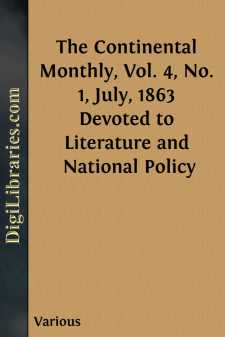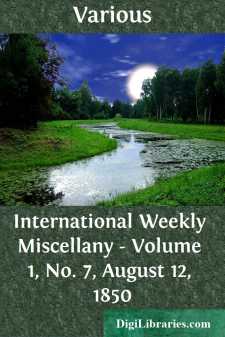Categories
- Antiques & Collectibles 13
- Architecture 36
- Art 48
- Bibles 22
- Biography & Autobiography 815
- Body, Mind & Spirit 144
- Business & Economics 28
- Children's Books 18
- Children's Fiction 14
- Computers 4
- Cooking 94
- Crafts & Hobbies 4
- Drama 346
- Education 58
- Family & Relationships 59
- Fiction 11829
- Games 19
- Gardening 17
- Health & Fitness 34
- History 1378
- House & Home 1
- Humor 147
- Juvenile Fiction 1873
- Juvenile Nonfiction 202
- Language Arts & Disciplines 89
- Law 16
- Literary Collections 686
- Literary Criticism 179
- Mathematics 13
- Medical 41
- Music 40
- Nature 179
- Non-Classifiable 1768
- Performing Arts 7
- Periodicals 1453
- Philosophy 65
- Photography 2
- Poetry 896
- Political Science 203
- Psychology 44
- Reference 154
- Religion 515
- Science 126
- Self-Help 85
- Social Science 82
- Sports & Recreation 34
- Study Aids 3
- Technology & Engineering 59
- Transportation 23
- Travel 463
- True Crime 29
Sort by:
by:
Various
OUR INDIAN MISSIONS. Nine schools, with 356 pupils; five churches, with 271 members; five stations; thirteen missionaries; thirty-seven teachers, are the statistics. The churches are Congregational, and the church and school go hand in hand. A careful survey of the necessities of these missions was made early in the year, and the estimate called for an appropriation of about $30,000. Repairs and...
more...
by:
Various
EMANCIPATION IN JAMAICA. The luminous summary of statistical facts published in the March number of the Atlantic Monthly for 1862, has, in a few pages, conclusively settled the question whether emancipation in the smaller islands of the British West Indies has been a success or a failure. It applies the standard of financial results, which, though the lowest, is undoubtedly the best; for the defenders...
more...
by:
Various
WOMEN AND LITERATURE IN FRANCE. From a sprightly letter from Paris to the Cologne Gazette, we translate for The International the following account of the position of women in the French Republic, together with the accompanying gossip concerning sundry ladies whose names have long been quite prominently before the public: "It is curious that the idea of the emancipation of women should have...
more...
by:
Various
ANDROS, SIR EDMUND (1637-1714), English colonial governor in America, was born in London on the 6th of December 1637, son of Amice Andros, an adherent of Charles I., and the royal bailiff of the island of Guernsey. He served for a short time in the army of Prince Henry of Nassau, and in 1660-1662 was gentleman in ordinary to the queen of Bohemia (Elizabeth Stuart, daughter of James I. of England). He...
more...
by:
Various
THE LANGUAGE OF FLOWERS.BY JNO. B. DUFFEY.( ) As, wandering forth at rosy dawn,When sparkling dew-drops deck the lawn,From glen and glade, and river-side,We bring young flowers—the morning's pride. And, bound in wreaths, or posies sweet,With flowers our favored ones we greet;For flowers a silent language own,That makes our maiden wishes known. A language that by love was wrought,And by fond love...
more...
by:
Various
GEORGE SAND, IN THE MEMOIRS OF CHATEAUBRIAND. George Sand is about to publish a book called "Memoirs of my Life," which is looked for with great expectations by both the admirers of her genius and the lovers of scandalous gossip. It is certain that if she makes a clean breast of her adventures and experiences, the world will have reason both for admiration and disgust over the confessions:...
more...
by:
Various
THE LIFE OF GEORG WILHELM FRIEDRICH HEGEL BY J. LOEWENBERG, PH.D. Assistant in Philosophy, Harvard University Among students of philosophy the mention of Hegel's name arouses at once a definite emotion. Few thinkers indeed have ever so completely fascinated the minds of their sympathetic readers, or have so violently repulsed their unwilling listeners, as Hegel has. To his followers Hegel is the...
more...
by:
Various
The receipts published in this number bring us to the end of the first three months of our fiscal year. The summary given above shows how we stand as compared with last year. Total compared with total, we are behind. May we not, however, hope that the turning-point will soon be reached, and that all through the rest of the year it shall be our privilege to chronicle a steady increase? We are out in the...
more...
by:
Various
SECOND PAPER. Having, in the preceding paper, described the general organization of an army, we proceed to give a succinct account of some of the principal staff departments, in their relations to the troops. Army organization—notwithstanding the world has always been engaged in military enterprises—is of comparatively recent institution. Many of the principles of existing military systems date no...
more...
by:
Various
American Missionary Association. ANNUAL MEETING. Our annual meeting at Lowell, Mass., October 23d to 25th, promises to be an occasion of great interest. A large proportion of the addresses will be from missionaries. The work throughout the year has been greatly blessed, despite the difficulties it has had to meet from lack of adequate means. The meeting opens at three o'clock, Tuesday afternoon,...
more...











